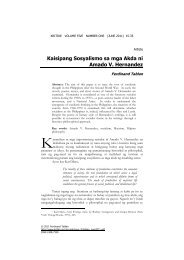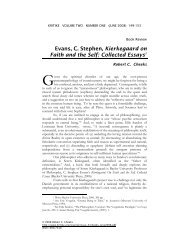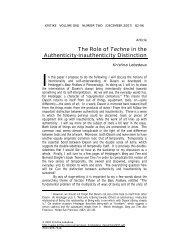The Paradox of Ipseity and Difference: Derrida's Deconstruction and ...
The Paradox of Ipseity and Difference: Derrida's Deconstruction and ...
The Paradox of Ipseity and Difference: Derrida's Deconstruction and ...
Create successful ePaper yourself
Turn your PDF publications into a flip-book with our unique Google optimized e-Paper software.
38 THE PARADOX OF IPSEITY AND DIFFERENCE<br />
by action <strong>and</strong> reaction. <strong>The</strong> case cannot be the classic<br />
sophism <strong>of</strong> the so-called “chicken-<strong>and</strong>-egg” pseudo<br />
paradox. <strong>The</strong> logic here is not casually linear but social. It<br />
does not presume to start with singularity. It starts with<br />
givenness, the presumption <strong>of</strong> facticity <strong>and</strong> therefore<br />
historicity. 25<br />
<strong>The</strong> dialectical interaction, then, occurs as a given condition <strong>of</strong> the ego;<br />
the world itself lends the possibility <strong>of</strong> encountering the Other, by shaping the<br />
consciousness <strong>of</strong> the subjective ego, they are able to meet in a context that<br />
allows them to acknowledge ipseity <strong>and</strong> difference through intersubjectivity. <strong>The</strong><br />
self then is not an enclosed consciousness but, rather, it is an openness that creates<br />
itself through its encounter <strong>of</strong> the Other in time <strong>and</strong> space. This encounter,<br />
however, does not lend itself towards a harmonic convergence <strong>of</strong><br />
consciousness, for in most cases the dialectical encounter between two<br />
consciousness involves differences in which Hegel would refer to as sublation 26 , or<br />
as Derrida would say, a necessary economy <strong>of</strong> violence or différance. 27 <strong>The</strong><br />
condition however <strong>of</strong> subjectivity is inevitable, for in the context <strong>of</strong> ”there-ness”<br />
or even that <strong>of</strong> the “there is,” time assaults the ego to reduce the Other as an<br />
object, <strong>and</strong> in this regard, Derrida would say that the “I” is not actually guilty <strong>of</strong><br />
committing violence against the other because time is violence 28 itself.<br />
<strong>The</strong> problem <strong>of</strong> the exteriority <strong>and</strong> interiority <strong>of</strong> the ego, however, is<br />
not the only problem that concerns subjectivity. For in its being-in-the-world, the<br />
ego is always already engaged in manifesting itself to an Other <strong>and</strong>, as Hegel<br />
would say, this manifestation <strong>of</strong> the self is always subjected towards “elements<br />
<strong>of</strong> varying significance” that affect the presentation <strong>of</strong> a self towards an Other.<br />
Thus, in the intention <strong>of</strong> manifesting itself towards an Other, the forces that<br />
act upon the self already contaminate the ego’s manifestations, <strong>and</strong> hence the<br />
possibility <strong>of</strong> failure towards the acknowledgment <strong>of</strong> the Other comes as a<br />
consequence <strong>of</strong> its presence as a fleeting singularity. In the essay Signature Event<br />
Context, Derrida notes that the grounds in which the consciousness is able to<br />
manifest its intention to express itself is always contaminated, not as an<br />
excluded accidental possibility, but as the very means <strong>of</strong> language itself in its<br />
repetition through an Other. 29 <strong>The</strong> problem <strong>of</strong> context for Derrida, reveals that<br />
25 Florentino Hornedo, Pagpapakatao (Manila: University <strong>of</strong> Santo Tomas Publishing<br />
House, 2002), 56.<br />
26 “…Self-consciousness has before it another self-consciousness; it has come outside<br />
itself. This has a double significance. First it has lost its own self, since it finds itself as an other<br />
being; secondly, it has thereby sublated that other, for it does not regard the other as essentially<br />
real, but sees its own self in the other.<br />
It must cancel this its other. To do so is the sublation <strong>of</strong> that first double meaning, <strong>and</strong><br />
is therefore a second double meaning. First, it must set itself to sublate the other independent<br />
being, in order thereby to become certain <strong>of</strong> itself as true being, secondly, it thereupon proceeds<br />
to sublate its own self, for this other is itself.” Hegel, op cit., 105.<br />
27 Derrida, Writing <strong>and</strong> <strong>Difference</strong>, 128.<br />
28 Ibid., 133.<br />
29 Cf. Derrida, “Signature Event Context,” in Limited Inc, 12.
















